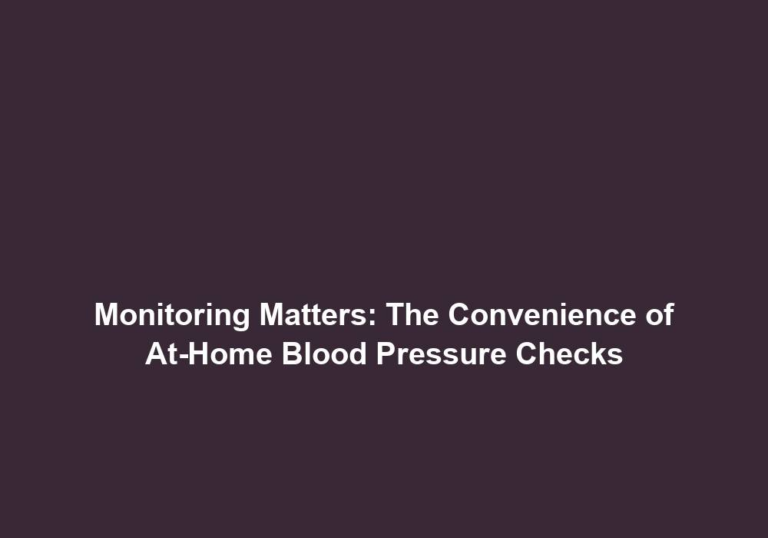Risk Factor Identification: Guarding Your Heart’s Future
Heart diseases have become a leading cause of death worldwide. In order to ensure a healthy future for your heart, it is crucial to identify and address the various risk factors that contribute to heart diseases. By understanding and taking preventive measures against these risk factors, you can significantly reduce the chances of developing heart-related complications. In this comprehensive article, we will delve into the different risk factors associated with heart diseases and provide you with valuable insights on how to protect your heart’s future.
Understanding the Risk Factors
Risk factors are conditions or habits that increase the likelihood of developing a particular disease. When it comes to heart diseases, there are several risk factors that can be categorized into two types: modifiable and non-modifiable.
Modifiable Risk Factors
Modifiable risk factors are those that can be controlled or altered through lifestyle changes. By addressing these factors, you can minimize the risk of heart diseases. Let’s explore some of the key modifiable risk factors:
-
Smoking: Smoking is a major risk factor for heart diseases. The toxins in tobacco smoke damage the blood vessels, leading to the buildup of plaque and increasing the risk of heart attacks and strokes. Quitting smoking is one of the most effective ways to protect your heart’s health.
- Quitting smoking not only reduces the risk of heart diseases but also improves overall lung health and reduces the risk of other smoking-related diseases like lung cancer.
- Seek support from healthcare professionals, join support groups, or use nicotine replacement therapy to increase your chances of successfully quitting smoking.
- Create a smoke-free environment by avoiding exposure to secondhand smoke.
-
Unhealthy Diet: A diet high in saturated fats, cholesterol, and sodium can contribute to the development of heart diseases. Incorporating a balanced diet rich in fruits, vegetables, whole grains, and lean proteins can reduce the risk.
- Limit the consumption of foods high in saturated fats, such as red meat, butter, and full-fat dairy products.
- Opt for healthier fats found in nuts, seeds, avocados, and olive oil.
- Reduce the intake of processed and packaged foods, which are often high in sodium and unhealthy trans fats.
- Increase the consumption of heart-healthy foods like fatty fish, nuts, and seeds that are rich in omega-3 fatty acids.
-
Physical Inactivity: Leading a sedentary lifestyle can increase the risk of heart diseases. Engaging in regular physical activity such as brisk walking, jogging, cycling, or swimming helps maintain a healthy weight, lowers blood pressure, and improves heart health.
- Aim for at least 150 minutes of moderate-intensity aerobic exercise or 75 minutes of vigorous-intensity aerobic exercise per week.
- Incorporate strength training exercises at least two days a week to improve muscle strength and overall fitness.
- Find activities you enjoy and make them a part of your daily routine, such as dancing, gardening, or playing a sport.
-
Obesity: Excess body weight puts additional strain on the heart and increases the risk of developing cardiovascular problems. Maintaining a healthy weight through a combination of regular exercise and a balanced diet is essential for a healthy heart.
- Set realistic weight loss goals and focus on losing weight gradually, aiming for 1-2 pounds per week.
- Seek guidance from a registered dietitian who can help you create a personalized meal plan and provide support throughout your weight loss journey.
- Monitor your portion sizes and practice mindful eating to avoid overeating.
- Incorporate regular physical activity into your routine to aid weight loss and improve overall fitness.
-
High Blood Pressure: Uncontrolled high blood pressure can damage the arteries and increase the risk of heart diseases. Regular monitoring, lifestyle modifications, and medication as prescribed by a healthcare professional can help manage blood pressure effectively.
- Monitor your blood pressure regularly at home using a home blood pressure monitor.
- Follow a low-sodium diet and limit the consumption of processed and salty foods.
- Engage in stress-reducing activities like meditation, deep breathing exercises, or yoga.
- Take prescribed medications for blood pressure management as directed by your healthcare provider.
-
High Cholesterol: Elevated levels of cholesterol in the blood can lead to the formation of plaque in the arteries, restricting blood flow to the heart. Adopting a low-cholesterol diet, exercising regularly, and taking prescribed medications can lower cholesterol levels.
- Limit the intake of foods high in cholesterol, such as fatty meats, full-fat dairy products, and fried foods.
- Increase the consumption of high-fiber foods like fruits, vegetables, and whole grains, which can help lower cholesterol levels.
- Engage in aerobic exercises like walking, running, or cycling to raise HDL (good) cholesterol levels and lower LDL (bad) cholesterol levels.
- Follow the prescribed medication regimen for cholesterol management as advised by your healthcare professional.
Non-Modifiable Risk Factors
Non-modifiable risk factors are those that cannot be changed but should still be considered when assessing the risk of heart diseases. These factors include:
-
Age: The risk of developing heart diseases increases with age. Men above the age of 45 and women above the age of 55 are more susceptible.
- Regular health check-ups become increasingly important as you age to monitor your heart health and detect any potential problems early.
- Engage in age-appropriate physical activity and consult with your healthcare provider for exercise recommendations.
- Make heart-healthy dietary choices and maintain a healthy lifestyle to minimize the impact of age-related risk factors.
-
Gender: Men are generally at a higher risk of heart diseases compared to premenopausal women. However, postmenopausal women catch up to men in terms of risk due to hormonal changes.
- Women should be aware of the increased risk after menopause and pay attention to their heart health.
- Discuss any concerns or symptoms with your healthcare provider, as women may experience different heart disease symptoms than men.
- Follow the same preventive measures as men, such as maintaining a healthy lifestyle and managing modifiable risk factors.
-
Family History: If you have a family history of heart diseases, especially if a close relative experienced heart problems at an early age, your risk is elevated.
- Inform your healthcare provider about your family history of heart diseases to assess your individual risk.
- Regular check-ups and screenings may be recommended to monitor your heart health more closely.
- Focus on modifiable risk factors to minimize the impact of genetic predisposition.
-
Ethnicity: Certain ethnicities, such as African Americans, Hispanics, and South Asians, are at a higher risk of heart diseases.
- Be aware of the increased risk associated with your ethnicity and take proactive measures to protect your heart’s health.
- Work closely with your healthcare provider to manage modifiable risk factors and monitor your heart health regularly.
- Educate yourself about your specific risks and preventive measures that may be more relevant to your ethnicity.
Protecting Your Heart’s Future
Now that we have identified the various risk factors associated with heart diseases, let’s discuss some proactive steps you can take to safeguard your heart’s future:
-
Regular Check-ups: Schedule regular check-ups with your healthcare provider to monitor your blood pressure, cholesterol levels, and overall heart health. Early detection and intervention can prevent or manage potential risk factors.
- Follow your healthcare provider’s recommendations for routine check-ups and screenings.
- Discuss any symptoms or concerns promptly to ensure timely diagnosis and treatment.
- Stay up-to-date with vaccinations, especially for influenza and pneumococcal infections, which can put additional strain on the heart.
-
Healthy Lifestyle: Adopt a heart-healthy lifestyle by following a nutritious diet, engaging in regular physical activity, maintaining a healthy weight, and avoiding smoking and excessive alcohol consumption.
- Focus on consuming a well-balanced diet that includes a variety of fruits, vegetables, whole grains, lean proteins, and healthy fats.
- Limit the intake of processed and sugary foods, as well as excessive alcohol consumption.
- Incorporate at least 150 minutes of moderate-intensity aerobic activity or 75 minutes of vigorous-intensity aerobic activity per week.
- Aim for a healthy weight by combining regular exercise with a calorie-controlled diet.
-
Manage Stress: Chronic stress can contribute to heart diseases. Find healthy ways to manage stress, such as practicing mindfulness, yoga, or engaging in hobbies that help you relax.
- Identify stress triggers and develop coping mechanisms to reduce their impact on your well-being.
- Practice relaxation techniques like deep breathing exercises, meditation, or progressive muscle relaxation.
- Engage in activities that bring you joy and help you unwind, such as spending time in nature, listening to music, or pursuing creative hobbies.
-
Medication Adherence: If you have been prescribed medication for managing blood pressure, cholesterol, or other heart-related conditions, ensure strict adherence to the prescribed regimen.
- Understand the importance of medication and its role in managing your heart health.
- Set reminders or use medication management apps to help you remember to take your medication as prescribed.
- If you experience any side effects or have concerns about your medication, discuss them with your healthcare provider before making any changes.
-
Educate Yourself: Stay informed about heart diseases, risk factors, and preventive measures through reliable sources. This knowledge will empower you to make informed decisions about your heart health.
- Seek information from reputable sources such as medical journals, trusted websites, and healthcare professionals.
- Stay updated with the latest research and guidelines related to heart diseases and prevention.
- Attend educational seminars or workshops organized by healthcare institutions or community organizations to enhance your knowledge.
-
Supportive Social Network: Surround yourself with a supportive social network that encourages and motivates you to maintain a healthy lifestyle. Engage in activities that promote heart health together, such as walking groups or cooking nutritious meals.
- Seek support from family, friends, or support groups to stay motivated and accountable for your heart-healthy lifestyle.
- Plan social activities that involve physical activity or healthy eating, such as hiking trips, cooking classes, or potluck gatherings.
- Share your goals and progress with your social network to celebrate achievements and inspire others to prioritize their heart health.
In conclusion, identifying and addressing the risk factors associated with heart diseases is essential for guarding your heart’s future. By understanding the modifiable and non-modifiable risk factors, you can take proactive steps to minimize the risk of developing heart-related complications. Remember, small changes in lifestyle and habits can have a significant impact on your heart’s health. Start taking care of your heart today for a healthier and happier future!







